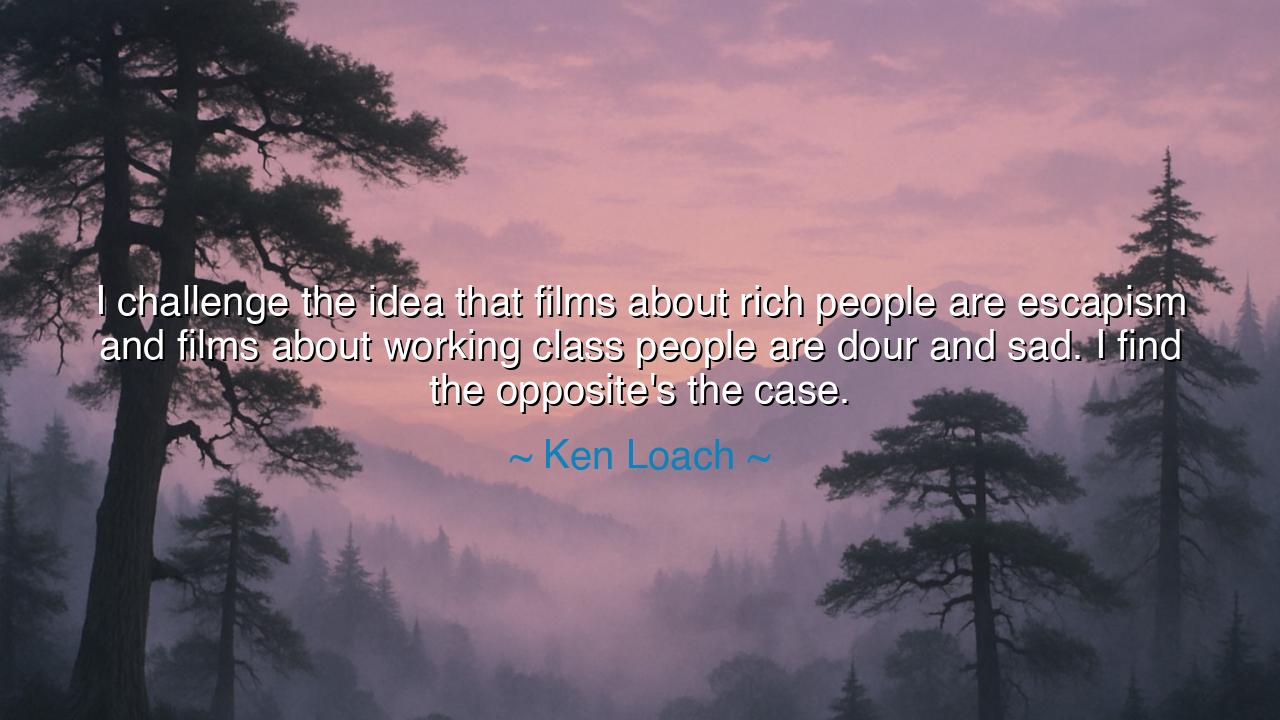
I challenge the idea that films about rich people are escapism
I challenge the idea that films about rich people are escapism and films about working class people are dour and sad. I find the opposite's the case.






Hearken, children of reflection, to the words of Ken Loach, who declares: "I challenge the idea that films about rich people are escapism and films about working-class people are dour and sad. I find the opposite's the case." In these words lies a meditation upon perception, storytelling, and the power of art to illuminate truth beneath the surface of society. Since the days of the ancients, philosophers and poets have cautioned against judging appearances alone, teaching that virtue, struggle, and joy often reside where one least expects them. Loach invites us to see beyond convention, to reconsider the assumptions we hold about life, class, and narrative.
The ancients understood that stories serve as mirrors to the soul and society. Aristotle, in his Poetics, observed that tragedy and comedy are not merely entertainment but reflections of human action and emotion, capable of revealing truths hidden by superficial appearances. Loach’s challenge—asserting that films depicting rich people may be bleak, while those depicting working-class people may brim with vitality—echoes this timeless insight: reality and art often contradict expectation, revealing depth in places overlooked.
Consider the life of Aeschylus, whose plays often portrayed kings and the powerful not as idealized figures but as subjects of hubris, fear, and moral complexity. The opulent lives of rulers were fraught with tension, intrigue, and existential peril, reflecting that wealth and status do not shield one from human suffering. Loach’s words resonate here: the perception of wealth as escapism is challenged by the recognition that the lives of the privileged may contain their own profound sadness and moral entanglement.
Yet the quote also celebrates the resilience, humor, and richness of ordinary life. Loach emphasizes that working-class people, often deemed dour, may embody vitality, solidarity, and the poignant triumphs of daily existence. Ancient playwrights, chroniclers, and philosophers frequently depicted common folk with a mix of admiration and empathy, recognizing in their labors and joys the enduring truths of courage, love, and community. In Loach’s vision, cinema honors this heritage, portraying the dignity and complexity of lives often neglected.
The quote further illustrates the power of perspective in storytelling. By subverting the assumption that wealth equates to glamour and the working class to melancholy, Loach invites audiences to experience a more authentic, nuanced reality. History offers parallels in the writings of Charles Dickens, who portrayed both aristocratic folly and the ingenuity and warmth of the laboring poor, revealing the surprising richness, humor, and resilience of those often underestimated.
From this reflection emerges a timeless lesson: never accept appearances at face value, whether in art or in life. True understanding requires attentiveness, empathy, and the willingness to recognize depth where others see simplicity. Loach teaches that dignity, struggle, and human spirit are not confined to one social stratum; rather, they manifest vividly across the spectrum of experience, challenging stereotypes and fostering insight.
Practical actions flow naturally. Approach stories, people, and experiences with an open mind, seeking the richness and complexity beneath superficial assumptions. Value perspectives from all walks of life, and challenge narratives that reduce reality to cliché or stereotype. In art, literature, or daily interaction, cultivate awareness of the hidden virtues, struggles, and joys present in every human existence.
Remember, children of the ages, that truth often lies hidden behind expectation and assumption. Ken Loach’s words illuminate the enduring principle that wealth and poverty, privilege and labor, joy and sorrow are not defined by class alone. By embracing this insight, we cultivate empathy, broaden our understanding, and honor the profound humanity present in all lives, recognizing that art—and life—finds richness in the places we least anticipate.






AAdministratorAdministrator
Welcome, honored guests. Please leave a comment, we will respond soon